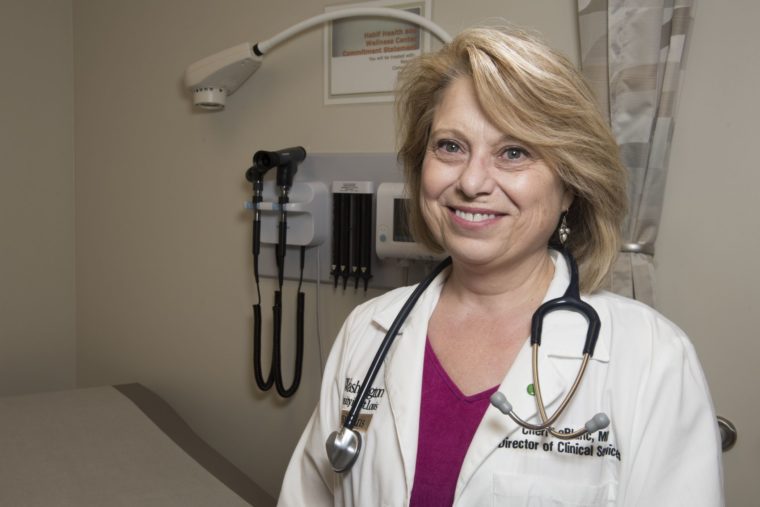Cheri LeBlanc, MD, has been appointed excutive director of Habif Health & Wellness Center at Washington University in St. Louis.
LeBlanc had served as interim director after the departure of Alan Glass, MD, who now serves as assistant dean of admissions at the School of Medicine. She joined the staff in 2013 as director of student health and wellness.
Tamara King, associate vice chancellor for student support and wellness, said LeBlanc has the experience and vision to address the unique health challenges facing college students.
“What set Dr. LeBlanc apart is her passion for college health,” King said. “She knows our students well and has strong relationships with our campus partners. But she’s not afraid to look at our issues differently and push for new and creative approaches to better deliver services.”
LeBlanc said mental health will be a top priority. In recent years, Student Health Services has seen in a spike in mental health calls, providing counseling and psychiatry services to more than 2,100 students in 2017 — nearly double the number of students served in 2014.
“So many of our students come here with mental illness or are ill-equipped to handle the pressures of college,” said LeBlanc, who also has worked at McGill University and Boston University. “The right intervention today can move them in a positive way for the rest of their lives. But we must have a broader array of appropriate resources, whether that be group therapy or one-on-one counseling or mindfulness skills.”
To that end, LeBlanc is expanding the center’s mental health resources and personnel. This summer, she hired a case manager to connect students with ongoing mental health needs to professionals in the community; a psychiatrist who specializes in working with LGBTQ students; and a psychologist who speaks Mandarin. Earlier this year, Student Health Services embedded a counselor in Seigle Hall for professional and graduate students. LeBlanc wants to place more counselors in academic buildings. She also plans to expand group therapy options and is studying telemedicine alternatives.
LeBlanc also is committed to improving services to victims of sexual assault and to strengthening prevention programs.
“We’re really focused on student support — making sure the broad array of resources are available, including more counselors and guaranteeing all of our staff are coming from a trauma-informed place,” LeBlanc said. “There is no doubt in my mind that all of the caregivers come from a trauma-informed place, but I want to make sure that whoever a person comes in contact with, whether that be our front desk staff or someone in our pharmacy, has had trauma-informed training.”
Kathy Steiner-Lang, assistant vice chancellor in student affairs, led a national search committee composed of students, staff and faculty members. She said Student Health Services plays a key role in helping Washington University achieve its academic mission.
“This position is not just about running a clinic,” Steiner-Lang said. “Student Health Services affects every part of campus. That’s why we selected someone who is committed to listening to students, serving different populations and collaborating with other members of the community to promote wellness.”
